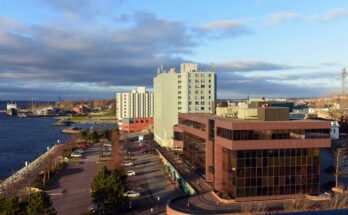Immigration Minister Marc Miller announced Wednesday that Ottawa is doing just that Rural and Northern Immigration Pilot (RNIP) a permanent immigration program this fall, and it also launched two new pilots to expand the ability of rural communities to attract more immigrants, especially Francophones.
“I am here to confirm that Immigration, Refugees and Citizenship Canada (IRCC) will make the RNIP permanent,” Miller said in Sudbury on March 6.
The new permanent program will be called the Rural Immigration Program (RIP) and will launch this fall alongside the new pilot programs.
The two new pilots will be the Rural Community Immigration Pilot (RCIP) and the Francophone Community Immigration Pilot (FCIP).
The RCIP will launch in autumn 2024.
Read more
Canada issues 1,470 invitations to apply (ITAs) under the lottery of all programs
Applicants for OINP Immigration must submit the Application Consent Form
Caps On Canada Study allows an open instrument, says education expert
This new pilot will strive to ensure that rural communities continue to have the ability to access programs that address labor shortages and help local businesses find the workers they need. It will provide pathways to permanent residency for newcomers who can help bridge critical job shortages and want to live long-term in these smaller communities.
The FCIP, which will also be launched this fall, will focus on increasing the number of French-speaking newcomers settling in francophone minority communities outside Quebec and will help ensure the economic development of francophone minority communities, while also helping in their restoration and growth. demographic weight.
The number of francophones is expected to increase with a new pilot program
“It has the capacity to double the number of people coming into this community,” Miller said in Sudbury.
Businesses in northern Ontario’s largest city were concerned about the pending completion of the RNIP this year and had called on Ottawa to make the RNIP permanent.
In an open letter to local Members of Parliament Viviane Lapointe and Nickel Belt Marc Serré, the Greater Sudbury Chamber of Commerce had called for the RNIP to become a permanent program.
“If you talk to any business owner and our members, a big challenge that they’ve had over the last few years is finding a talented workforce and a skilled workforce and … the program is something that facilitates that,” Geoffrey Hatton, chairman of that chamber of commerce and president and CEO of Spectrum Telecom Group, reportedly said CTV News.
“Twenty percent of our staff (are) international hires, so it’s a big impact for us.”
By the end of last year, 4,595 newcomers had obtained their permanent residence through the RNIP.
The latest IRCC data reveals that Canada welcomed 2,855 new permanent residents through the RNIP.
Ontario received the lion’s share of RNIP immigrants last year, 1,865, while British Columbia welcomed 665 new permanent residents through the program.
Through the RNIP, Manitoba welcomed 190 new permanent residents last year, Saskatchewan 90 and Alberta 45 in 2023.
This year, RNIP is off to a strong start with 680 new permanent residents coming through the program in January alone.
Watch the video
The findings of a report by the Northern Policy Institute, Community immigration pilot making economic ‘cents’: How the rural and northern immigration pilot is boosting the local economy in Thunder Bayemphasize the importance of this immigration program for rural and northern communities.
“RNIP helps to attract immigrants to smaller communities by offering them a pathway to permanent residency,” the report said.
“In turn, it gives communities the opportunity to choose which workers have the skills most desired by their local industries and are more likely to settle and stay in that northern or rural community in the long term.
“By doing this, the RNIP benefits both skilled migrants and smaller communities at the same time.”
Eleven communities participate in the RNIP
To take part in the pilot, which has been extended until its permanent version launches later this year, communities must:
- have a population of 50,000 or less and be located at least 75 km from the core of a census metropolitan area, or;
- it has a population of up to 200,000 people and is considered remote from other larger cities, according to Statistics Canada’s Remoteness Index.
Here are the communities participating in the pilot program:
|
COMMUNITY |
Community website |
|
North Bay, ON |
https://northbayrnip.ca/ |
|
Sudbury, ON |
https://investsudbury.ca/why-sudbury/move-to-sudbury/rnip/ |
|
Timmins, ON |
www.timminsedc.com |
|
Sault Ste. Marie, ON |
www.welcometossm.com |
|
Thunder Bay, ON |
https://gotothunderbay.ca/ |
|
Brandon, UK |
www.economicdevelopmentbrandon.com |
|
Altona/Rhineland, UK |
www.seedrgpa.com |
|
Moose Jaw, SK |
https://www.moosejawrnip.ca/ |
|
Claresholm, AB |
www.claresholm.ca |
|
Vernon, BC |
https://rnip-vernon-northok.ca/ |
|
West Kootenay (Trail, Castlegar, Rossland, Nelson), BC |
https://wk-rnip.ca/ |
Candidates for immigration through the RNIP must meet federal and community requirements.
Federal requirements include qualifying work experience or an international student exemption.
Candidates must have one year (1,560 hours) of full-time or part-time work experience in the last three years, but it does not need to be continuous or be with only one employer. However, it must include most of the main and essential duties listed in the National Occupational Classification (NOC) and unpaid and self-employed hours are not counted.
Candidates who are international students are exempt from the work experience requirement provided they have graduated with a master’s or doctoral degree or:
- graduates with a credential from a minimum two-year post-secondary program in the recommended community;
- have studied as a full-time student for a full duration of two or more years;
- received the credential no more than 18 months before the date of application for permanent residence, and;
- they were in the community for at least 16 of the last 24 months spent studying for the credential.
Those who have graduated with higher degrees must still:
- have studied as a full-time student for the duration of the degree in the recommended community;
- received the degree no more than 18 months before applying for permanent residence, and;
- have been in the community for the duration of their studies.
RNIP applicants must meet language requirements
There are basic minimum language requirements for RNIP with the required level based on the job classification according to the national occupational classification system. Candidates must also have a Canadian high school diploma or an equivalent foreign credential with an accredited Educational Credential Assessment (ECA) report.
Language proficiency can be demonstrated through the Canadian Language Standards (CLB) or Niveaux de compente linguistique canadiens (NCLC).
These results must be submitted from a designated language test and be less than two years old at the time of application.
Under the program, applicants must demonstrate that they have enough money to support themselves and family members until they are settled in their community. This includes family members who may not be coming to Canada.
Candidates already working legally in Canada are exempt from the settlement fund requirements.
This money cannot be borrowed from another person and proof of funds can include:
- bank account statements;
- documents showing real estate or other investments (such as stocks, bonds, debentures or treasury bills), or;
- documents guaranteeing the payment of a certain amount of money payable, such as bank notes, cheques, traveller’s checks or money orders.



